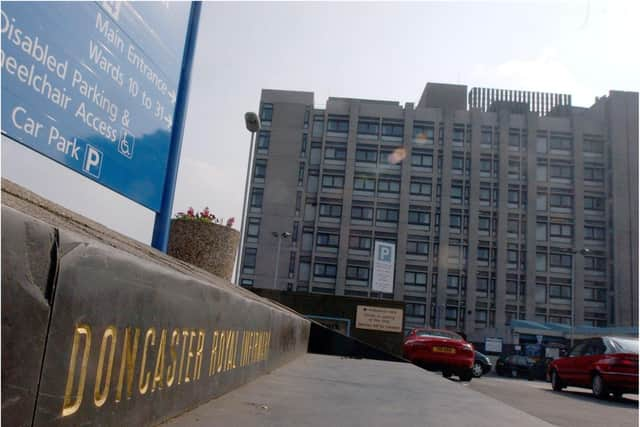Coronavirus: Doncaster Royal Infirmary issues statement about town's first COVID-19 patient
and live on Freeview channel 276
A spokesman said: “We can confirm that we are currently caring for a patient who has tested positive for COVID-19 at Doncaster Royal Infirmary.
“Those who have been in contact with the patient have been given health information about symptoms and emergency contact details to use if they become symptomatic, as well as advice regarding self-isolation.”
Advertisement
Hide AdAdvertisement
Hide AdDr Tim Noble, Medical Director at Doncaster and Bassetlaw Teaching Hospitals, said: "As a trust, we have put the necessary precautions and safeguards in place and our clinicians are working to national guidance to ensure they are compliant with Infection Prevention and Control measures to minimise any associated risks.


“Earlier this week, we restricted our visiting hours, and we have started to significantly scale back outpatient and elective appointments and procedures. Patients who require urgent and emergency care should still use appropriate services.
"The best advice for our local residents is to wash your hands regularly with soap and water, avoid touching your eyes, nose or mouth and use, and discard, tissues if you cough or sneeze. These are the best steps that we can all take to help reduce the spread of Covid-19.”
Coronavirus: the facts
What is coronavirus?
COVID-19 is a respiratory illness that can affect lungs and airways. It is caused by a virus called coronavirus.
What caused coronavirus?
Advertisement
Hide AdAdvertisement
Hide AdThe outbreak started in Wuhan in China in December 2019 and it is thought that the virus, like others of its kind, has come from animals.
How is it spread?
As this is such a new illness, experts still aren’t sure how it is spread. But.similar viruses are spread in cough droplets. Therefore covering your nose and mouth when sneezing and coughing, and disposing of used tissues straight away is advised. Viruses like coronavirus cannot live outside the body for very long.
What are the symptoms?
The NHS states that the symptoms are: a dry cough, high temperature and shortness of breath - but these symptoms do not necessarily mean you have the illness. Look out for flu-like symptoms, such as aches and pains, nasal congestion, runny nose and a sore throat. It’s important to remember that some people may become infected but won’t develop any symptoms or feel unwell.
What precautions can be taken?
Washing your hands with soap and water thoroughly. The NHS also advises to cover your mouth and nose with a tissue or your sleeve (not your hands) when you cough or sneeze; put used tissues in the bin immediately and try to avoid close contact with people who are unwell. Also avoiding touching eyes, nose and mouth unless your hands are clean.
Should I avoid public places?
Advertisement
Hide AdAdvertisement
Hide AdThe advice now is to avoid public places and any non-essential travel. Travel abroad is also being advised against for the next 30 days at least, and many European countries have closed their borders.
What should I do if I feel unwell?
Don’t go to your GP but instead call NHS 111 or look online at the coronavirus service that can tell you if you need medical help and what to do next.
When to call NHS 111
NHS 111 should be used if you feel unwell with coronavirus symptoms, have been in a country with a high risk of coronavirus in the last 14 days or if you have been in close contact with someone with the virus.
Sources: World Health Organisation and NHS